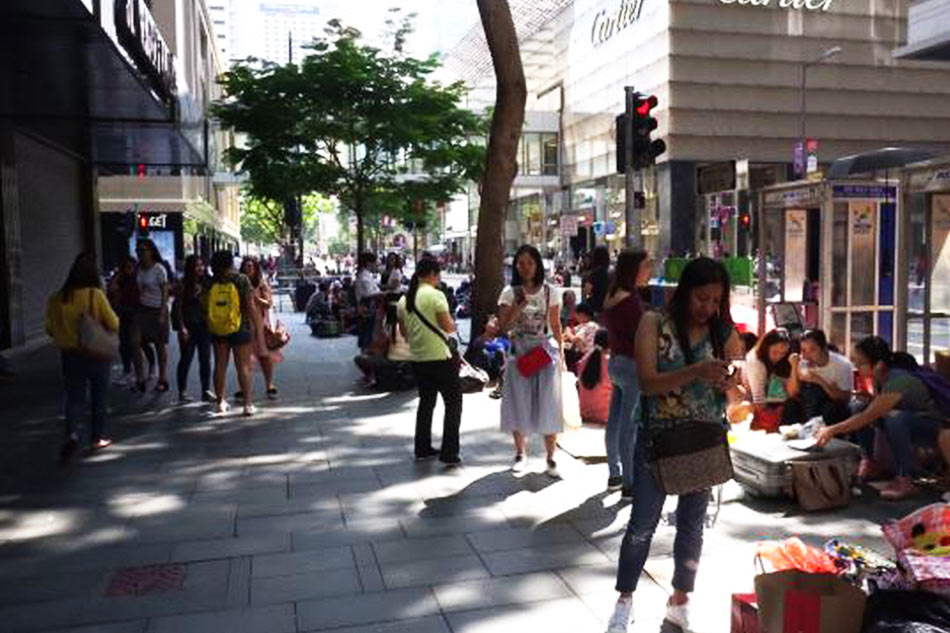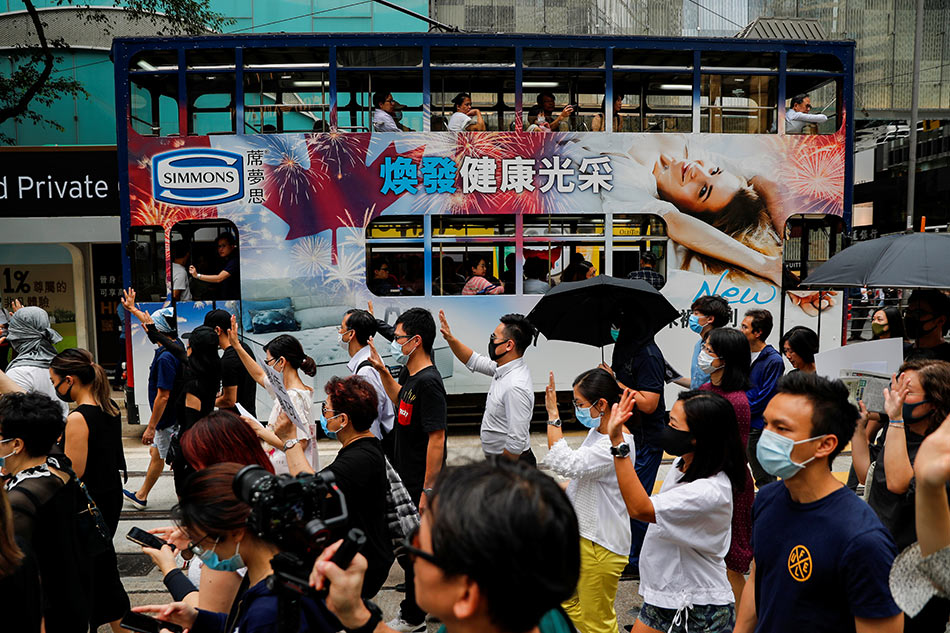As Hong Kong fights to keep its rights, OFWs in crossfire face losing jobs
Jan Yumul
HONG KONG—As Hong Kong entered its 20th weekend of anti-government demonstrations, triggered by the now-withdrawn fugitive bill, some Filipino domestic workers say they are facing termination as their employers have decided to relocate overseas.
Hong Kong on Wednesday, Oct. 23, formally announced the withdrawal of the extradition bill that would have allowed the transfer of criminal suspects it does not have an extradition treaty with such as Macau, Taiwan, and mainland China. The demands of the protests have since grown, among them an independent probe into alleged police brutality, amnesty for arrested protesters, categorizing the protests as riots as those convicted could face a hefty jail term of up to 10 years, and universal suffrage.
Among those preparing for her termination is "Roberta" (not her real name), a Filipino domestic worker who has been with her Indian employers for eight months.
Her employers are due to relocate to Singapore within the year, as their family would often find themselves caught in the crossfire between police and protesters in Kowloon. Roberta has been working in Hong Kong for eight years. She is due to return to the Philippines this month for a two-week vacation and will then break the news to her family. Her employment ends on Nov. 24.
"Actually mga June ganyan, nag-uusap na mga amo namin. Maglilipat na sila ng lugar kasi tinanong na rin nila ako kung nakapunta na ako ng Singapore. Sabi ko, hindi," said Roberta. "Nagbigla din ako kasi nagsabi siya na pupunta na daw silang Singapore, na humanap na daw ako ng bagong amo," she added.
(Actually it was around June when my employers talked about it. They're going to move, because they asked me if I've ever been to Singapore and I told them I've never been. I was taken aback when they said they would move to Singapore, that I needed to start looking for a new employer.)
Despite the current political and economic climate in Hong Kong, Roberta is hopeful she will be able to find new employers here. Singapore, for her, is not an option as domestic workers are paid higher in Hong Kong at 4,520 Hong Kong dollars while Singapore does not have a minimum wage set for maids.
The situation is a double-edged sword for Libeth A.C. and Marie M. who arrived in Hong Kong in May and July, respectively.
Libeth and Marie are colleagues who work for a British-Chinese man, who is a lawyer, and Hong Kong Chinese woman hotelier, a married couple in their 80s.
The couple, who owns a 4,500 square-foot house in Clear Water Bay in the New Territories, has told Libeth and Marie's other colleague that they are due to relocate to the United Kingdom this January. The couple employs three maids and two Chinese drivers. They are unaware of the fates of their male colleagues.
While the Filipinos have avoided much of the weekend mayhem, as their rest days are usually on weekdays, but with no fixed day, they consider the termination a blessing because they have complained of abuse from their elderly employers.
"Minsan nanduduro ’yung mga amo namin, hinahagis ’yung plato na aluminum. Nagdadabog. ’Pag may mga basura itatapon sa amin," Libeth told ABS-CBN News.
(Sometimes they would point their fingers at us, throw aluminum plates at us. They would throw tantrums. When there's trash, they would throw it in front of us.)
Marie added: "Masaya po (ako) para makalayo sa kalupitan."
Both domestic workers have children they left behind in the Philippines. They are hopeful they will still find luck in Hong Kong. Prior to Hong Kong, Libeth worked for some years in Saudi Arabia and Qatar, while Marie had spent some three years in the Middle East and two years in Malaysia.
If worse comes to worst, both domestic workers are eyeing Singapore as their next destination.
"Gusto ko sana du’n na lang sa Pilipinas ulit pero wala pong budget. Negosyo mag-umpisa sana kahit sa maliit pero wala pang ipon," said Libeth.
Marie added: "Sa Pilipinas? Mahirap doon. Walang makukunan ng pagtustusan."
For long-time domestic worker Aurora Villahermosa, a mother of one who has been working in Hong Kong for 27 years, the situation has not affected her French employer of 12 years. But she empathizes with friends who have lost their jobs and are no longer in Hong Kong because their expat employers were forced to migrate elsewhere due to the unrest.
"Napakarami dito na affected talaga. Marami na nga nag-ano . . . ’yung mga expat . . . Dami ng mga kaibigan ko nawalan ng trabaho. Mga iba Korean ang amo at Japanese. Mostly Korean," said Villahermosa.
(Many are affected. I have many friends who've lost their jobs, some have Korean employers and Japanese. Mostly Korean)
Villahermosa told ABS-CBN News she also has siblings working for Chinese employers. But all appeared to be well with them, too.
" ’Yung mga kapatid ko Chinese mga amo nila s’yempre nag-uusap kami araw-araw. Napag-uusapan ’yang ganyan bagay. Wala naman. ’Yung amo nila wala naman sinasabi sa kanila na sooner or later," said Villahermosa.
(My siblings have Chinese employers. Of course, we speak with each other every day. We talk about these things, but there's nothing. Their employers have not said anything about losing their jobs sooner or later.)
For Rowena Libunao, an OFW in Hong Kong for 19 years now, says she has been with her employer for 12 years. They've also discussed developments in Hong Kong, but are not letting go of her just yet.
"Sabi niya (employer), if comes things worse (sic), maybe 5 to 10 years, no more helper. But I don't know kung ano totoo. Basta sabi niya, we are safe still. Sabi niya don't worry. You have family here because you stay here for so long. You are my family," Libunao told ABS-CBN News.
(My employer said if things worsen, maybe in five to 10 years, there'd be no more helpers. But I don't know what's true. My employer says we're safe. She said don't worry. You have a family here because you've stayed here for so long. You are my family.)
"’Pag ayaw pa ni amo at sabihin safe ako, stay pa rin dito kasi walang . . . Ewan ko kung may trabaho roon sa Pilipinas na naghihintay. Kung meron, why not, di ba?" Libunao said.
(If my employer doesn't want me to leave yet and I am safe, I'll still stay here. I don't know if there's work waiting for me in the Philippines. But if there is, why not, right?)


Comments